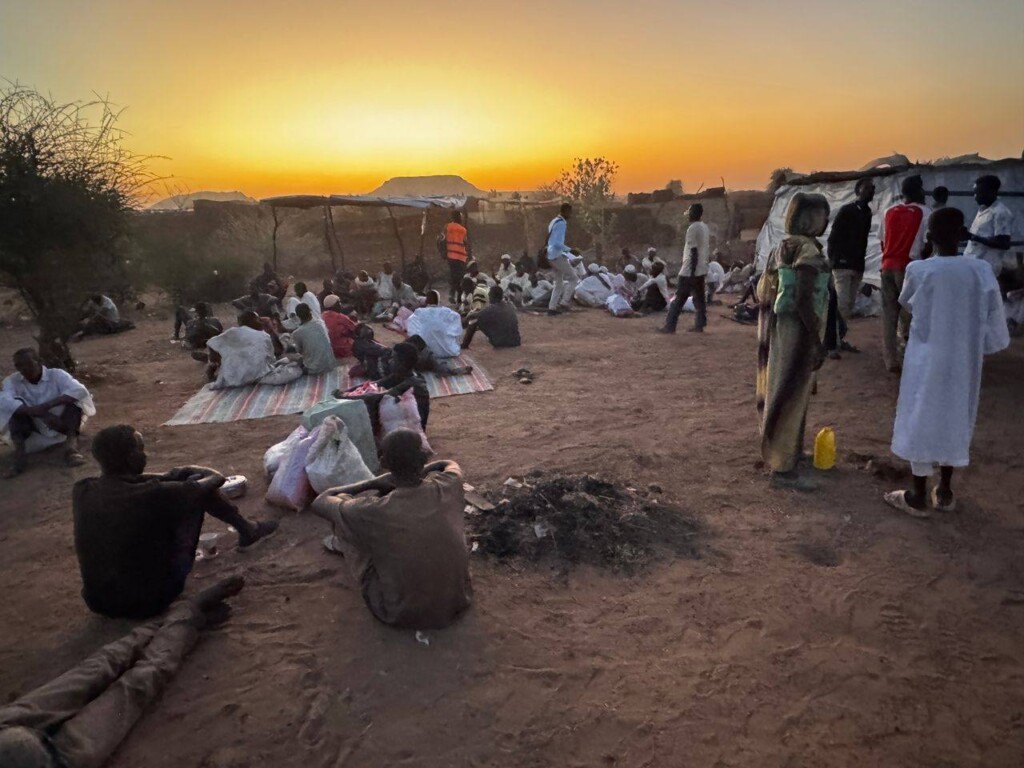Civilians sheltering in war-torn El Fasher hope to return to homes after siege

Arrival of displaced people from El Fasher to Tawila in North Darfur on November 5 (Photo: Coordination of Displaced Persons and Refugees)
Hundreds of displaced people in El Fasher, North Darfur, continue to stay in shelters within the city, while many hope to return to their homes after months of suffering and clashes that separated families and left extremely difficult humanitarian conditions. Abu El Qasim Ibrahim Musa, from the Imtidad El Tijaniyya neighbourhood and currently residing in the shelter at the Sharqiyah Girls’ School, said they had endured difficult times in recent months, with even obtaining basic necessities like bread being extremely hard to come by. He added, “Now, thank God, food is available… We are waiting to return to our homes.”
‘Rest assured, my children, I am fine…’
Musa told Radio Dabanga that he had contracted shrapnel and recently received treatment, and his condition is improving. His family members are scattered between Mellit and most of them are still unaware of his fate. He said, “I want to reassure my children in Mellit and my brothers and sisters in Umm Badr, Tawila, and El Gedaref that I am well.” He added that the Rapid Support Forces gathered civilians in one place on the day they seized El Fasher, and they have remained in displacement camps ever since. He also mentioned that a number of wells have recently been repaired.
Crime scene
At the conclusion of his visit to Darfur, UN Under-Secretary-General Tom Fletcher described the region as “a truly horrific scene and the epicentre of human suffering in the world,” while characterizing El Fasher as a “crime scene,” based on survivor testimonies. In a press conference on Monday, he explained that the crisis in Darfur disproportionately affects children, who represent one in five of those killed in El Fasher. Describing the plight of children fleeing El Fasher, he added, “I met many children who carried their younger siblings to safety, and strangers who picked up infants from the streets after their parents had been killed.”
I have nothing but the jellabiya I’m wearing
At another shelter at Omdurman Islamic University in El Fasher, a resident told Radio Dabanga that the situation is much better now than before, and that they are waiting to be allowed to return to their neighbourhoods after the Rapid Support Forces complete the cleanup operations, they said they are carrying out. He added: “These people have been very helpful to us… food and drink are available, but now I have nothing but the jellabiya I’m wearing. I lost everything. I want to reassure my family that I’m okay.”
For his part, an official in one of the community initiatives that rushed to provide humanitarian aid to the city’s residents confirmed to Radio Dabanga that several local initiatives are currently working to distribute food and basic necessities inside El Fasher, in an attempt to bridge the humanitarian gap left by the war.
How do I get back to my home in El Fasher?
These testimonies come at a time when thousands of residents are still living in shelters within the city after being unable to return to their homes or leave them due to what the Rapid Support Forces say are remnants of fighting and widespread destruction in residential neighbourhoods.
Patrick Youssef, the regional director of the International Committee of the Red Cross in Africa, told a press conference in Geneva on Tuesday that every day that passes without access to El Fasher is a “lost day,” stressing that his organization not only needs to provide assistance and leave El Fasher, but also to assess the situation on the ground “and listen to the people there” directly about the suffering they have endured.
Youssef said the committee had been sounding the alarm for months to draw attention to El Fasher, and that the situation in and around the city had now become “extremely tragic.”
Talks regarding entering El Fasher are very sensitive
Tom Fletcher, the UN Under-Secretary-General for Humanitarian Affairs, said regarding the situation in El Fasher that the international organization is striving to enter the famine-stricken city of El Fasher in Darfur and treat it as a “crime scene” to investigate systematic executions, detentions, and rapes.
Fletcher said talks with the Rapid Support Forces, which control El Fasher, were “very sensitive” but he hoped the United Nations would be able to enter El Fasher within days or weeks, not months. “We will make a hard effort to get in,” he said.
He added that providing aid is a huge task for the United Nations in the city, which will be treated as a “crime scene” to be investigated following reports of systematic executions, detentions, and rapes.











 and then
and then